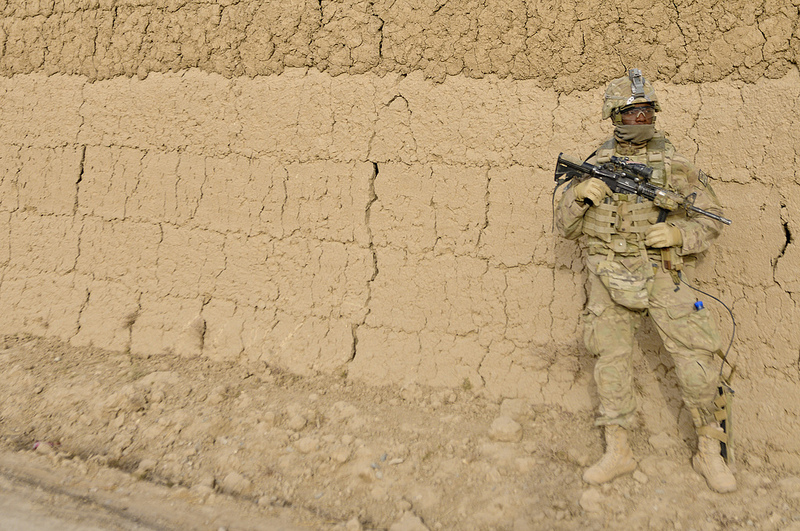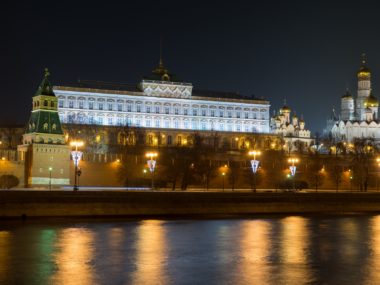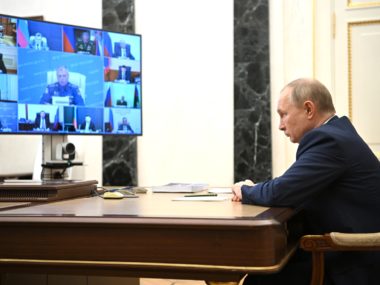
Is war a science? I don’t ask that to be flippant, since most of this blog’s readership’s careers are premised on the notion that there are basic laws and principles that most wars follow. In Robert Gates’ much-discussed new memoir, Duty, he decries the White House for its apparent blasé treatment of war. He writes that he was “deeply uneasy with the Obama White House’s lack of appreciation — from the top down — of the uncertainties and inherent unpredictability of war,” adding that “they all seem to think it’s a science.”
This dismissal of “science” from the Pentagon is not a new phenomenon. In his new book, The Insurgents, Slate’s Fred Kaplan recounts a heated conversation between John Nagl, a coauthor of the Army’s FM 3-24 manual on counterinsurgency, and Ralph Peters, a retired Army lieutenant colonel and fierce critic of COIN. Here’s a relay of their November 21, 2006 exchange, according to Kaplan:
Starting to answer one of Peters’ points, Nagl said, “Speaking as a social scientist –”
Peters interrupted: “You’re not a social scientist. You’re a soldier.”
Nagl, a bit puzzled, replied, “Well, I’m a social scientist and a soldier.”
“No!” Peters thundered. “You can’t be both. Which is it?”
Is Peters right? Is there a danger in enlisting pointy-headed soldiers like Nagl, and treating war as some kind of abstract and falsifiable science?
Gates and Peters inhabit two separate criticisms of the ways our recent wars have been fought. Gates appeared to be taking issue with Obama’s barely-out-of-college data-driven NSC staff that overlooked the fact that war wrecked people’s lives and were more impressed with stats and poll numbers. In this way, he comes off sounding like the cultural anthropologist scoffing at the large-n econometrician who makes overarching theses without knowing the conflicts up close and personal.
Peters, on the other hand, is old school in his thinking that war involves killing, clear and simple. He seems to take issue with bumper-sticker slogans lifted from the COIN manual like “clear, hold, and build” and “winning hearts and minds.” Their basic disagreement is that Nagl, echoing Kalyvas and other civil war scholars, holds that knowledge is everything and that counterinsurgency is not just about killing insurgents, but also finding them. But Peters takes exception to Nagl and other social scientists-cum-soldiers who treat all insurgencies as monolithic, especially since in Peters’ opinion, religiously motivated insurgencies are in a class of their own. In other words, the wisdom of FM 3-24 might have worked in, say, Vietnam circa 1968 but not in Afghanistan circa 2010, when facing an enemy willing to carry out mass killings and a host government whose interests do not align with the foreign occupier and principal counterinsurgent.
The slew of books out related to the “rethink” of COIN (David Kilkullen’s Out of the Mountains among others) bristle with interesting anecdotes like the one above, showing us how the sausage was made as we bungled our way into Iraq, appeared to be making progress post-2007, only to bungle it again as we pulled out precipitously.
But it also calls into question our ability to treat war as a “science” to be studied and analyzed dispassionately, the resistance such studies encounter from the military brass, and the differences between studying war and, say, mating rituals among rhesus monkeys. For those of us who have done journalism or ethnographic interviews in war settings, it is hard to separate yourself from a caring human being and a dispassionate researcher (I ran into this while carrying out interviews in a Syrian refugee camp).
For those in charge of deploying forces, too much empathy and they risk looking like the Colonel Davenport character in Twelve O’Clock High; too little empathy and they may come off as insensitive to the human suffering war entails.








5 comments
I agree with Peters’ comment and I’ll try to put together a brief, coherent, argument here about why. If you are are a soldier, you are a soldier and you have a mission to do – one that has determined both by circumstance and by the civilian leadership (in the US case, at least.) Your thinking, planning, and process can be influenced by a number of factors – including a social science background – but your function is to be a soldier first and foremost.
Looking at this from the other side, it is impossible to hold dual hats as a “social scientist” and a soldier when your job is to be a soldier. Again, you can apply social science methods to problems, but you are not dispassionately doing science – you are trying to find solutions to your problems using a certain type of thinking/methodology.
To answer the question posed in the post: I think war is too important to be left to any one group. It’s the type of problem that needs to be explored by soldiers, social scientists, historians, artists, politicians, and everyone. I’m a war pluralist.
Perhaps this is the fact that I’m a civilian, but I actually lean further in the other way. In my opinion, Nagl isn’t enough of a social scientist. His book on the insurgencies in South Vietnam and Malaysia, for example, did not do enough to identify the critical factor of civilian politics that led to the ruin of one state and the enduring dominance of the other.
War is both an art and a science, and it requires balance between objective and subjective, between the quantifiable and the qualitative, between gut and analysis. The best leaders, military and political, understand this and not only manage the tension, but use it to their side’s best advantage. Anyone who demands that it be only one thing is too fond of his own intellect.
This argument isn’t framed correctly. War is a social science only to the extent that any human activity is. Soldiering maybe solely about the trade-craft of a soldier, but soldiering isn’t the sum of warfare. War as an activity is a lot more than the soldier, and I don’t hesitate to call imbeciles fellow officers who fail to grasp this. War is first and foremost the final state of escalation of a political conflict.
The Soldier and Sailor is brought into the conflict as a main actor when violence and coercion become acceptable terms for solving the conflict. The application of that violence is the Soldier’s duty, and his officers are charged with the when and the why of its application. The thing about the when and the why is that they both require judgement and assessment of other humans, which requires an education in humans, i.e. the social sciences (poli-sci, anthro, history, economics). Soldiering isn’t a social science at all…it is hard science of steel on target and refueling rates. The problem with the hard science is that it has an ideal end-state, genocide, when targets are exhausted and further movement is not required. War is not a hard science, it is the application of all tools of a society, hard science included, in resolving a group conflict that has escalated to the use of violence.
The Soldiers’ duty is to be extremely highly proficient in their tasked skills. The Officers’ duty is to be prepared to direct the application of those skills. The latter task is impossible if the Officer’s intellectual efforts are completely consumed by soldiering and he devalues all other forms of knowledge. Unless, of course, he is only ever expected to practice genocide.